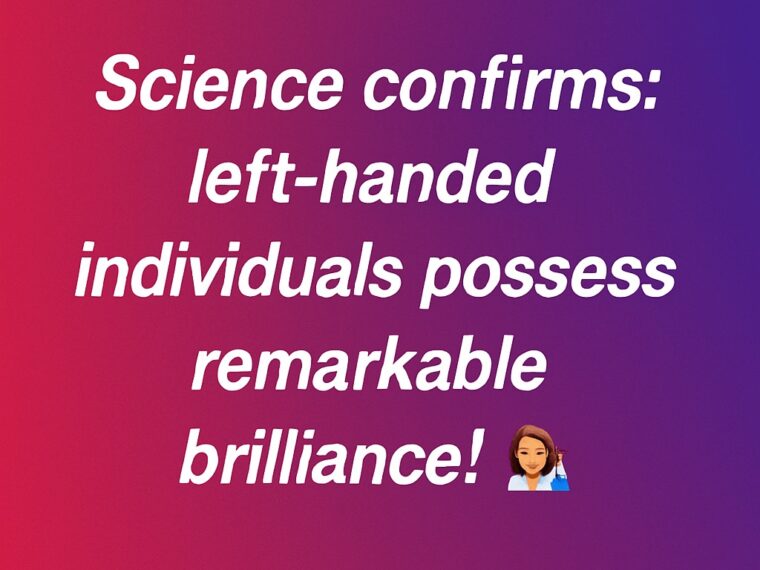“Science confirms: left-handed individuals possess remarkable brilliance!”
This striking statement isn’t just a feel-good headline. While handedness has long been a topic of fascination, recent studies and neurological insights suggest that left-handed people often possess unique cognitive, creative, and problem-solving abilities that set them apart. But where does science truly stand? Are left-handers more intelligent, more creative, or simply different? Let’s dive into the research.
✋ What Does It Mean to Be Left-Handed?
Left-handedness, or left-dominant hand preference, affects roughly 10–12% of the global population. It’s a minority trait that has sparked myths, cultural biases, and even discrimination for centuries. Historically, the left side was associated with awkwardness or even evil (the Latin word sinistra means both “left” and “sinister”).
But today, science views handedness through a more refined lens: a window into how the brain is organized.
🧬 The Brain of a Left-Hander: Built Differently?
Hand preference stems from hemispheric brain dominance. In right-handed people, the left hemisphere tends to control language, logic, and fine motor skills. But for left-handers, brain organization can differ.
What science shows:
- 30% of left-handers have more symmetrical or reversed brain lateralization.
- This can lead to stronger inter-hemispheric communication via the corpus callosum, the bridge between the two brain hemispheres.
- Enhanced neural connections often correlate with flexible thinking and multitasking skills.
Bottom line:
🧠 Left-handed brains may be wired for more complex processing and cross-talk between hemispheres.
💡 Are Left-Handed People Smarter?
There is no direct link between left-handedness and higher IQ in a strict academic sense. However, multiple studies suggest left-handed individuals may excel in specific types of intelligence.
Research highlights:
- A University of Athens study (2007) found left-handed participants performed better in divergent thinking tasks, which test creativity and idea generation.
- A 2019 study from the University of Oxford indicated left-handers scored higher in spatial reasoning and complex mathematical problem-solving.
- Einstein, Da Vinci, Marie Curie, and Alan Turing—all thought to be left-handed—were exceptional thinkers who defied conventional logic.
Key strengths observed in left-handers:
- Visual-spatial intelligence
- Nonlinear thinking
- Pattern recognition
- Abstract reasoning
So, while they may not ace every standardized test, many left-handers shine in real-world problem-solving, innovation, and conceptual thinking.
🎨 Creativity and the Left-Handed Advantage
Creativity isn’t just about painting or composing music—it’s about seeing the world differently. And left-handed people often do.
Why?
- Brain connectivity: Left-handers often use both hemispheres more actively.
- Experience in adaptation: Growing up in a right-hand dominant world may enhance flexibility and problem-solving skills.
- Neurological pathways: Atypical neural development can foster unique thinking patterns.
Famous left-handed creatives:
- Leonardo da Vinci
- Pablo Picasso
- Jimi Hendrix
- Lady Gaga
- Oprah Winfrey
These figures aren’t just famous—they’re creative trailblazers, each known for innovation, vision, and challenging norms.
⚖️ The Left-Handed Struggle – And Strength
Growing up left-handed isn’t always easy. Left-handers must adapt to:
- Scissors, desks, can openers made for right-handers
- Writing smudges
- Musical instruments and sports gear designed for the majority
- Stigmas in certain cultures that treat left-handedness as “wrong”
Yet this constant adaptation may lead to one important quality: resilience.
Adapting to a right-hand world may:
- Build mental flexibility
- Develop better motor coordination
- Improve empathy and perspective-taking
In short, left-handers may be better equipped to think outside the box—not just because of their brains, but because of their experiences.
📚 Academic Performance and Career Trends
Do left-handers perform differently at school or in the workplace?
Academic patterns:
- Some studies show left-handed children may struggle with handwriting and early reading, but often catch up or excel later on.
- Others suggest left-handers outperform their peers in math, music, or spatial tasks, especially when encouraged.
Career trends:
- Left-handers are disproportionately represented in creative professions, such as art, architecture, writing, and design.
- They’re also well-represented in fields requiring strategic thinking, like law, politics, and chess.
Interestingly, a study by St. Lawrence University found more left-handed individuals among Mensa (high-IQ society) members than right-handed ones.
⚙️ Cognitive Skills Where Left-Handers May Excel
| Cognitive Skill | Left-Handed Edge |
|---|---|
| Creativity | Divergent thinking, outside-the-box ideas |
| Spatial Awareness | Geometry, visual puzzles, 3D concepts |
| Emotional Sensitivity | Higher empathy, intuitive understanding |
| Music & Rhythm | High representation among musicians |
| Problem-Solving | Unique logic pathways, innovative insight |
🧪 What Causes Left-Handedness?
While the exact cause isn’t fully understood, science suggests a combination of genetic, hormonal, and environmental factors.
Possible contributors:
- Genetics: Certain gene clusters (like LRRTM1) are linked to left-hand dominance.
- Prenatal environment: Hormonal exposure in the womb (especially testosterone) may influence handedness.
- Birth factors: Premature birth or birth trauma is slightly more common among left-handed individuals.
- Twin studies: Left-handedness occurs more often in identical twins, pointing to a genetic link.
So, left-handedness is not a flaw or anomaly—it’s part of the rich diversity of human development.
💼 Famous Left-Handed Thinkers and Leaders
Here’s a quick look at brilliant left-handers who changed the world:
| Name | Field | Notable For |
|---|---|---|
| Albert Einstein | Physics | Theory of Relativity |
| Leonardo da Vinci | Art & Science | Renaissance genius, inventor, anatomist |
| Barack Obama | Politics | 44th U.S. President |
| Marie Curie | Chemistry | Nobel Prize in two sciences |
| Alan Turing | Computer Science | Breaking the Enigma code, AI pioneer |
| Bill Gates | Technology | Co-founder of Microsoft |
| Mozart | Music | Iconic composer |
| Emma Watson | Arts & Activism | Actor, UN Goodwill Ambassador |
🧭 Conclusion: Left-Handed, Right-Minded
So, is it true that left-handed individuals possess remarkable brilliance?
✅ Yes—and no.
While being left-handed doesn’t automatically make someone a genius, scientific evidence supports real cognitive and creative advantages associated with left-handedness.
Left-handers often:
- Think more flexibly
- Approach problems differently
- Excel in visual, artistic, and conceptual domains
- Adapt to challenges with resilience
Whether it’s neurological wiring or life experience, being left-handed is not just a quirk—it’s a powerful trait that reflects diversity in thinking, expression, and intelligence.
So if you’re left-handed, take pride.
And if you’re not? Celebrate the left-handers in your life—because they just might see the world in a way you’ve never imagined.





